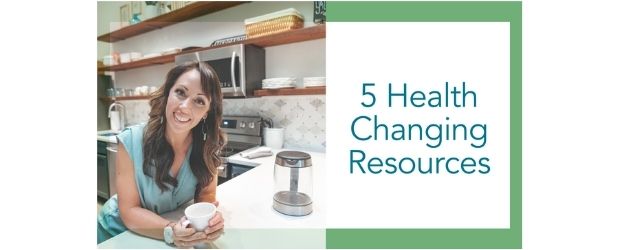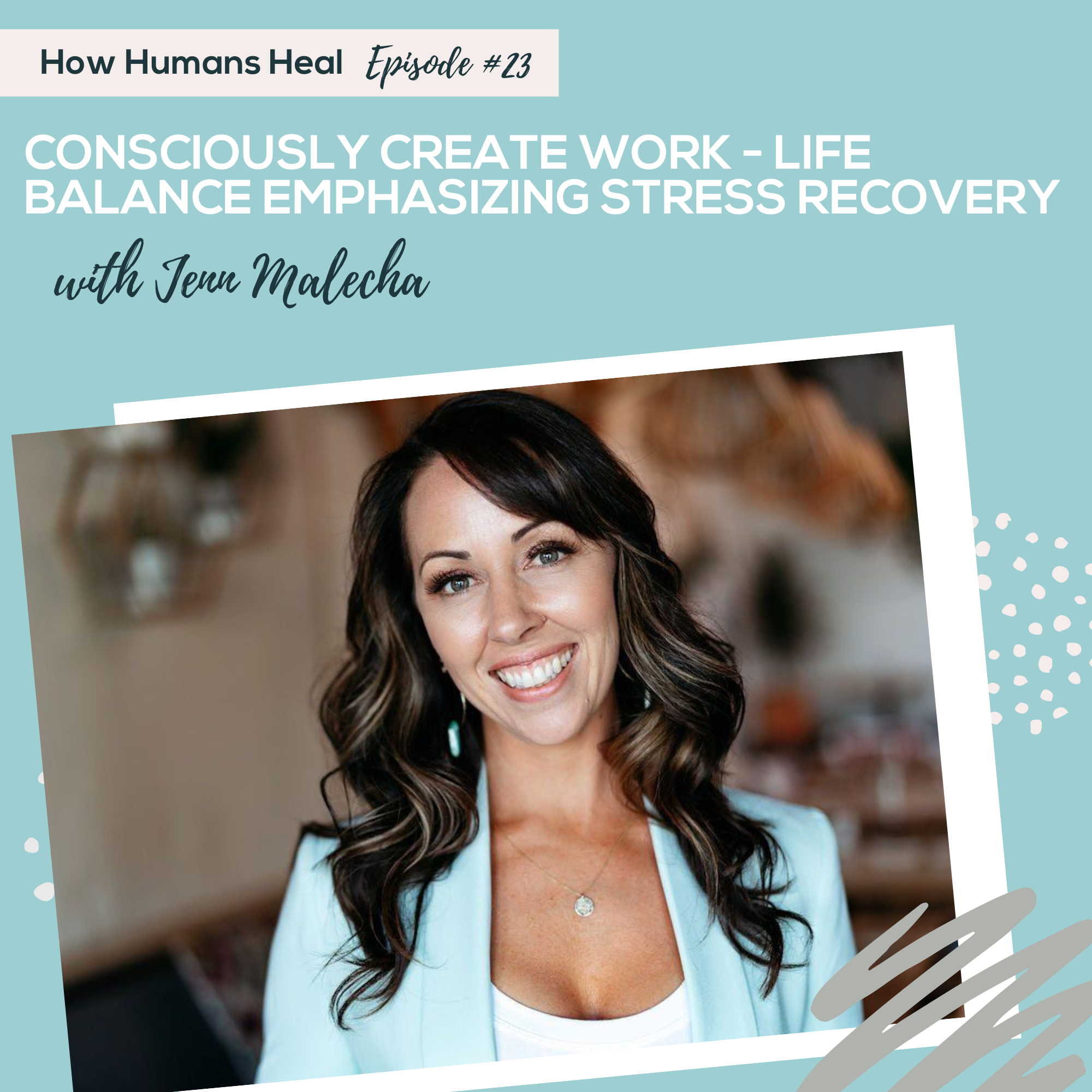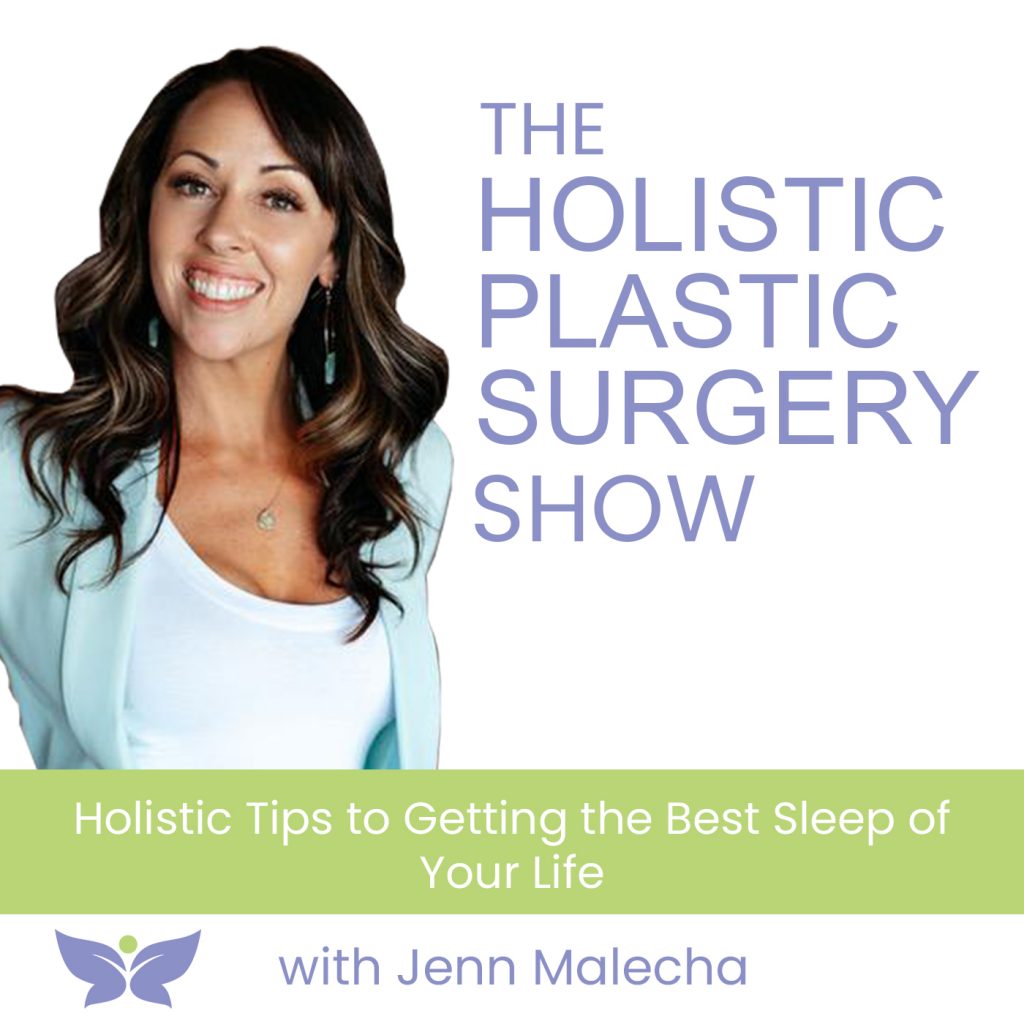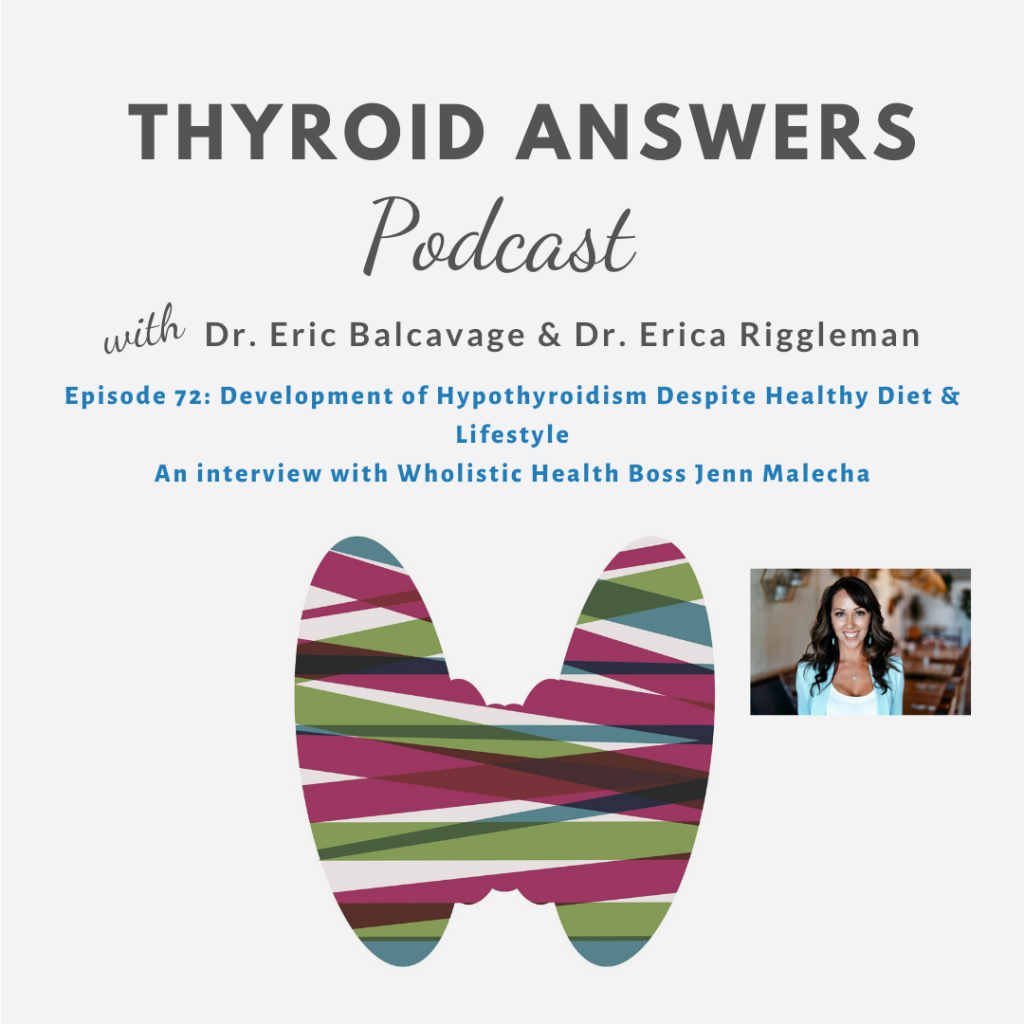3 ways to reduce bloating and boost energy

Can you believe the end of the year is almost here? Sometimes life feels like it’s moving at a snail’s pace and other days it feels like it’s moving at warp speed.
Either way, if you’re bloated and low on energy, every day is a struggle.
It’s a struggle to look in the mirror and feel good about yourself, to be present with loved ones, to be as productive in life as you want to be, and even to experience joy and happiness.
I’ve been there and many of my clients have too. It’s not fun. So to help you stop the struggle, I’m sharing 3 ways you can instantly reduce bloating and boost energy.
Despite what is going on the world around us, and what feels outside of our control, the one thing we do have control over is our health. When you tune out what is going on around you and tune into your body, the possibilities of feeling like your best self and having your best health are endless.
There once was a time when I was out of tune with my body too; seeking answers externally and spinning my wheels when my body was holding them all along.
Healthy is a way of being, not just doing.
You see, I was doing a lot of “healthy things”, but I wasn’t exactly embracing healthy as a way of being. I was running my body into the ground daily and barely keeping it afloat with my so-called healthy eating and exercise habits.
For example, I was racing through meals and inhaling my food in a hurry to get to the next thing on my to-do list. More often than not, I would chug down a breakfast smoothie on the way to the office, work while eating lunch, and rush home to eat dinner only to shovel it down so I could do all of my before bed routine things.
This is how most of us live life, always on the go suffering through bloating, low energy and a variety of other nagging health issues.
When we move through life like this, it drastically diminishes our ability to digest food properly leading to unnecessary bloating, poor nutrient absorption and a lack of energy (not to mention food cravings that also get triggered!).
Your body can only heal and digest properly in a relaxed state.
Therefore, one of the keys to getting rid of bloating for good and boosting your energy is learning to slow down around meal time, give your body space to digest, rest and repair.
In this week’s video and blog, I share 3 ways you can slow down around meal time to support digestion, instantly reduce bloating and boost energy.
Seeing who could finish their dinner the fastest was a game we played at the dinner table when I was a kid, and on top of that if you cleared your plate you got dessert. My parents had the best intentions in the world, filling our plates with whole foods but eating fast and expecting dessert afterwards were some old habits I had to learn how to break in order to have my ideal health and weight.
Our modern fast-paced world doesn’t exactly encourage a relaxed eating state either. Meetings often take priority over lunch periods, we sit in front of the TV or scroll our favorite social media feed catching up on the day’s happenings while we eat.
All of which triggers the sympathetic nervous system, also known as your fight or flight response. Originally this brilliant response evolved as a means of survival, if you ran into a lion while hunting, your fight or flight response would kick in so you could hightail it out of there by sending all of your blood flow and resources outwards for quick moving and quick thinking, and by deprioritizing actions such as digestion to conserve resources for your escape.
However, these days your body doesn’t’ know the difference between a lion and the day-to-day stressors you encounter such as working through a lunch break and rushing through meals so you can move onto the next thing. It responds the same, diminishing digestion in hopes of survival but leaving you feeling bloated, nutrient deficient and tired.
The good news is, there are a few simple things you can do that don’t take much time or effort, to instantly flip the switch in your brain and body to get you out of the flight or fight response and into the parasympathetic rest and digest mode.
In a parasympathetic state, your body sends blood flow and resources inwards to nourish internal organs, effectively digest food and heal all of which reduces bloating and boosts energy!
Here are 3 ways you can slow down around meal time to support digestion, instantly reduce bloating and boost energy:
#1- Before eating; inhale for 5 seconds, hold for 5 seconds, exhale for 7 and repeat 5-10 times.
When you adopt the deep rhythmic breathing pattern of a relaxed person, your body automatically flips the switch from being stressed to in a place of rest and digest.
This is a great tool you can also use during other times of the day to get into a relaxed state more frequently to allow more healing to happen.
#2 – Chew every bite 20 times or more.
Digestion actually begins in the mouth. Your saliva contains digestive enzymes to help breakdown food before it hits your stomach so taking action to adequately chew your food reduces digestive stress that can lead to bloating and increases absorption of nutrients to boost your energy and healing all around.
#3 – Put your utensils down between bites.
This is a societal thing. Next time you’re around others eating observe how everyone is shoveling their next bite in their mouth before they are even done chewing the one they are working on!
Setting your fork, spoon or other utensil you might be using down in between bites slows down the sense of urgency you might have to get through a meal, and it also reinforces the act of chewing each bite thoroughly for all of the benefits previously mentioned to reduce bloating and boost energy.
Putting these 3 tips into play will also help you be more present and in tune with your body when it comes to food. You may also find that it’s easier to notice when you’re full to avoid overeating, how certain foods don’t work well for your body or that you’re able to go longer periods of time between meals without snacking because you actually digested the food you ate.
You can’t out-supplement, out-diet, or out-exercise a too-busy lifestyle or overworked body.
It’s time to embrace healthy as a way of being, and not just doing by tuning everything else out and tuning into your body.
If you’d like to dive deeper into what is causing your bloating and low energy by getting your hands on the right lab tests and resources to find the missing pieces of your health puzzle, click here to schedule an Ideal Health and Weight Discovery Session with me.
#TBT Are you underestimating stress?

Oh man, it’s been quite a week leading up to an intense moment in U.S. history. There’s been an enormous amount of energy and emotion swirling around the recent presidential election.
What you may not realize is just how much the stress of this past week has affected you. If you’re feeling wiped out, exhausted, irritable, bloated or not sleeping well then stress just might be the culprit.
But here’s what you really need to know about stress so you can feel your best. Stress is more than the mental and emotional challenges we face, it’s much broader than that.
So this week here’s a #throwbackthursday blog to help you assess your burden of stress and ways to reduce it so you can feel like yourself again.
***
In this week’s video and blog, I help you to identify if you’re underestimating the daily demands of stress on your body, and simple things you can do to destress, boost digestion and healing!
***
#TBT 5 ways to prevent breast cancer…

I was reminded the other day how common breast cancer can be when a good friend of mine shared about her mom being diagnosed that week.
Luckily they caught it in an early stage so the prognosis looks promising.
However, just because breast cancer is common doesn’t mean it’s normal or that you or your loved ones are destined to be subjected to it. Cancer is fueled by inflammation and lifestyle factors so there’s a huge opportunity to prevent it and even reverse it if one has it.
So in honor of Breast Cancer Awareness Month, I’m bringing back this blog to share 5 ways to prevent breast cancer with you so you and your loved ones can be in control of your health and destiny.
***
According to Breastcancer.org, they estimate in 2019 alone 268,600 new cases of invasive breast cancer along with 62,930 new cases of non-invasive breast cancer are expected in U.S. women, and about 2,670 new cases of invasive breast cancer are expected to be diagnosed in men.
So as I said last week, early detection of breast cancer significantly increases your chances of survival.
BUT reducing your risk factors for cancers significantly decreases your chances of getting cancer ever!
High risk factors for breast and other types of cancer can include:
- Family history/genetics
- High sugar/carbohydrate diet
- Use of plastic food and water containers
- Excess estrogen circulating in the body
- A sluggish liver and poor detoxification system
- High oxidative stress (cellular/DNA damage)
- Repeated exposures to hormone altering toxins and radiation
Contrary to popular belief, your genetics dictate ONLY 20% of your health outcomes, and your lifestyle drives the other 80%.
This is great news!
It means you have more control than you probably thought you did over whether you get cancer, autoimmune conditions and chronic or terminal illnesses.
Inflammation is what drives all dysfunction and disease in the body, so when you control inflammation it’s like containing wildfire. The more you contain it, the less devastation it can create.
In this week’s video and blog, I want to give you 5 things you can do to reduce inflammation and your risk not just for breast cancer, but for all types of cancer and chronic diseases!
To start, let’s recap on what some of the most common high risk factors for breast and other types of cancer, terminal illnesses and chronic diseases are. They can include:
- Family history/genetics
- High sugar/carbohydrate diet
- Use of plastic food and water containers
- Excess estrogen circulating in the body
- A sluggish liver and poor detoxification system
- High oxidative stress (cellular/DNA damage)
- Repeated exposures to hormone altering toxins and radiation
You can’t change your genetics but you can change how they impact your health by adopting healthy behaviors that keep them from fostering disease states.
Remember, your genetics dictate ONLY 20% of your health outcomes, and your lifestyle drives the other 80%.
So here are 5 things you can do to reduce inflammation so you can keep your genes happy and healthy, and to prevent cancer or other chronic diseases…
#1 – Eat Anti-Inflammatory & Pro-Antioxidant
You put food in your body every day that can either fuel the inflammatory fire or help to put it out. To drastically reduce inflammation every time you eat, avoid the top inflammatory foods such as gluten, dairy, sugar, soy and alcohol. And then look to replace them with antioxidant-rich foods to reduce oxidative stress (aka cellular and DNA damage) such as goji berries, organic dark chocolate, artichokes, cilantro, elderberries, and wild-caught salmon.
#2 – Rest & Recover From 10-4
From 10pm to 4am is when your body performs critical repair of all of your cells, flushing of toxins and restoration of all systems. It’s like taking your body in for a tune up every night! However, if you’re not sleeping during this timeframe your body can’t perform these duties which can lead to hormone imbalances, toxic back-ups and a multitude of other issues that can trigger inflammation leading to disease. Aim to be asleep by 10pm at least 5 nights per week.
#3- Move & Release
Moving your body daily helps you to maintain a healthy weight, your strength and cardiovascular health AND to release toxins. The lymphatic system is the body’s natural sewage system to eliminate toxins and excess estrogen that can drive cancer and disease, but the problem is that it doesn’t move itself. When you move, the lymphatic system moves too. The more you move the more inflammation and cancer causing toxins can be released!
#4 – Stop & Shift
Did you know that stress can cause inflammation and genetic alterations too? Stress is inevitable but having a daily de-stress routine in place is a proactive way to prevent it from accumulating and contributing to chronic inflammation that can lead to disease. See where you can fit in as little as 5 minutes of deep breathing or meditation in your day. And at a minimum when you feel stressed – stop and shift your mindset by inhaling for 5 seconds, holding your breath for 5 seconds and exhaling for 7. Repeat this 5-10 times to instantly get out of stress mode!
#5 – Tackle The Toxins
Prioritize minimizing your exposures to inflammatory and cancer-causing toxins by focusing on the things you put in and on your body that have the largest impact on your health. You can do this by eating organic food as much as possible, drinking and cooking with only filtered water and swapping out your personal care products such as lotions, toothpaste, deodorant, shampoo and conditioner for less toxic and more environmental-friendly brands.
By taking action in these 5 areas not only will you drastically reduce your risk for cancer and other chronic diseases, but I can almost guarantee you’ll instantly notice an improvement in your energy, weight and overall sense of well-being.
***
Let’s make a pact to make cancer prevention something we’re aware of all year long, not just during the month of October!
And if you missed it, in last week’s blog I also shared two cutting-edge tools men and women can use to self screen for breast cancer and its high risk factors. You can check out that blog here.
When eating healthy isn’t healthy…

I’m curious, what does eating healthy mean to you?
When I graduated from college after studying fitness, nutrition, and health for 4 years, I thought eating healthy meant you should…
- Create a calorie deficit by eating less and moving more
- Have a snack or meal every 2 hours
- Always eat 3 solid meals per day
- Eat low fat, lean meats, veggies, fruits, dairy, starches, and whole grains according to the food guide pyramid now known as the “plate”
So I did exactly what I was taught and I felt like crap instead of feeling great and having my ideal health and weight.
It turns out, there’s a LOT more to eating healthy than what we were taught in school or what you might have read on your own about diets and nutrition.
In fact, some so-called healthy foods aren’t healthy for you.
It took me years to figure out what foods were healthy for my body. When I finally figured it out, it made getting the results I desired so much easier! So I want to help you cut to the chase and get to the bottom of what foods are healthy for you so you can feel like your best self too instead of wasting time trying to figure it out.
I see so many clients and people feeling frustrated about food and eating healthy. They’ve tried just about everything with little to no results. They’ll literally say…
I’m eating healthy but I’m not getting any results!
Do you find yourself feeling frustrated like this too?
In theory, they are “eating healthy.” They are often eating a Paleo, Whole30, Keto, or a generally well-rounded and clean diet. In some cases, they are eating mostly organic foods, good sources of meats, and even avoiding some of the well-known inflammatory foods.
But they still aren’t getting results. They still struggle with digestive upset, weight, anxiety, hormone imbalances, or other nagging health issues.
All because eating healthy isn’t always healthy for YOU.
In this week’s video and blog, I’ll reveal why some of the healthy foods you’re eating might not be healthy for you, and give you tips to figure out what is healthy for YOU.
There’s a difference between eating healthy and eating right for your body.
Eating right for your body will incorporate healthy foods but not all healthy foods are right for your body.
Most diet approaches tend to focus on food elimination, which is good considering that often times it means eliminating the top inflammatory foods such as gluten, dairy, sugar, soy, alcohol, and even other grains or foods containing lectins.
However, most dietary approaches fail to consider two key components to eating healthy for your body:
- Macronutrient (protein, carb, and fat) balance
- Specific food sensitivities
Eating the right balance of proteins, carbs and fats gives your body the right ratios of fuel so it can function at its potential. Understanding and eating according to your macronutrient needs can instantly:
- Reduce digestive stress
- Increase energy
- Fight off food cravings
But you can still run into issues when eating the right balance of macronutrients if you’re eating foods that you’re sensitive to.
Food sensitivities aren’t always obvious. They don’t always show up as digestive upset which is why you might think you don’t have any. Other common food sensitivity symptoms can include:
- Anxiety
- Skin breakouts
- Low energy or fatigue
- Poor sleep
- Weight gain or resistant weight loss
Food sensitivities or poor macronutrient balance could certainly be secretly sabotaging your healthy eating efforts and results!
As I’ve shared before, take a banana for example. Around the world, most would agree it’s a healthy food but if you have a sensitivity to bananas OR they contain too many carbs and sugars for what your body can tolerate in one sitting, then they aren’t a healthy food for you.
When you eat something like a banana that has these negative effects on you, it spikes blood sugar and inflammation, reduces nutrient absorption, disrupts hormone balance, messes with your sleep and energy, and leaves you craving more food to get another energy bump.
When my husband found out he was sensitive to beef he lost 5 pounds within a week of removing it from his diet.
Beyond these two key components, there could be even more to consider such as high oxalates and FODMAPs (Fermentable Oligosaccharides, Disaccharides, Monosaccharides, and Polyols)
Oxalates are a naturally occurring element in foods and in the body, but an abundance of oxalates lead to kidney stones, chronic joint pain, mineral deficiencies, and more. Oxalates can especially become problematic when Candida or yeast overgrowth is going on the body.
Some of the foods highest in oxalates include:
- Dark chocolate
- Nuts
- Berries
- Citrus fruits
- Beets
- Sweet potatoes
- Zucchini and other summer squashes
- Dark leafy greens such as spinach and certain kinds of kale
Just about every one of them is considered a healthy food!
And FODMAP foods can be problematic with an overly inflamed or leaky digestive system making it hard to breakdown these foods leading to fermentation and bacteria overgrowth in the gut.
Some of the highest FODMAP foods are:
- Garlic
- Onion
- Fruits
- Grains
- Certain nuts and legumes
See how you could be eating so-called healthy foods that aren’t actually healthy for YOU?
The best healthy eating plan takes YOUR body and specific needs into consideration and combines the elements related to macronutrient balance, food sensitivities, and other physiological factors.
When working with clients to figure out what foods are right for their body, we always do a series of functional lab tests to uncover all of the pieces to their health puzzle and then use that data to guide recommendations for how to eat healthy for their body.
The series of tests will often include a:
- Food sensitivity test to pinpoint specific foods they are reactive to
- Metabolic typing test to assess ideal macronutrient balance
- Stool sample test to evaluate digestive and intestinal health
There is no one-size-fits-all when it comes to eating healthy for YOUR body.
If you want to explore what foods are right for your body, click here to get my Food & Body Language Log to start dialing in your macronutrient balance.
And if you want to get your hands on the right lab tests and resources to explore it even deeper, click here to schedule an Ideal Health and Weight Discovery Session with me.
The struggle is real…

“It is truly a great cosmic paradox that one of the best teachers in all of life turns out to be death. No person or situation could ever teach you as much as death has to teach you. While someone could tell you that you are not your body, death shows you. While someone could remind you of the significance of the things that you cling to, death takes them all away in a second. While people can teach you that men and women of all races are equal and that there is no difference between the rich and the poor, death instantly makes us all the same. The question for you is, are going to wait until that last moment to let death be your teacher?”
-Michael A. Singer, The Untethered Soul: The Journey Beyond Yourself
***
In the face of death, we finally truly appreciate life.
This experience hit very close to home for me when my mother passed away in 2016, and again when my two best fur-friends left my side not long ago.
The current pandemic and events of 2020 have also brought this teaching into the light for so many around the world; whether you’ve suffered the loss of a loved one or have feared for your life.
Needless to say, this year has been mentally, emotionally, and physically exhausting, and it’s not over yet.
But today I’m going to give you hope and inspiration to be the healthiest and happiest you can be, despite what might be going on in the world.
Death is a part of life. Struggles and challenges are part of life. These are things we can not avoid. Sometimes they are deeply sad and frustrating moments, and yet something we can learn so much from.
Typically it takes a catastrophic event such as a diagnosis or near-death experiences for someone to realize the current way of being isn’t sustainable and that they need to do things differently to improve or support their health.
This year has created a global catastrophic event encouraging all of us to examine our lives, our health, and our environment. It’s given us moments to pause, to reflect on what really matters, and to re-prioritize.
In the midst of it all, I too have faced many inner challenges, most of them related to choosing something else over my health and myself…
The conflict to “push through it” and keep working even when I know I shouldn’t
Struggling to stay mindful and make healthy food choices when things feel chaotic
Should I exercise to relieve stress although I’m exhausted or rest?
Making time to meditate instead of retreating and getting sucked into TV or social media
Who or what should I believe in these very odd and unique times
The struggle is real on a daily basis.
These inner challenges are so common for so many, even if death or struggle are not knocking at our door. The hustle and bustle of life, the ever-evolving political climate, technology, and the upcoming holidays can make it difficult to put yourself and your health first.
Within a few days, after my mom passed away in 2016, I came down with my first head cold in over 3 years. I was so congested it felt as if my head was going to explode.
This is how stress showed up in my body – as a cold encouraging me to rest.
The signs were clear. My body was telling me to rest, to not work, to not exercise as I normally would, and to create space for healing to happen.
The emotional load from what has been going on between the pandemic and other events this year could be taking a HUGE toll on your health and you may not even realize it.
For example, emotional stress can:
- Diminish digestive power and your ability to absorb nutrients from food resulting in nutrient deficiencies
- Alter sleep quality leaving you feeling foggy-headed, irritable, and not fully recovered in the morning to bounce out of bed or get through the day
- Increase cortisol hormone production leading to other hormone imbalances, food cravings, and weight gain
The younger, less healthy version of me wouldn’t have listened to my body, in fact, I would have completely ignored it. I would have shown up to work but wouldn’t really have been present. I would have pushed myself to workout even though I was exhausted. I would have drowned my sorrows in social events and wine, and meditation would have never even crossed my mind.
Our body will do what we ask it to do, but that doesn’t mean that we should.
The way I treated my body in the past largely contributed to the adrenal dysfunction, Hahsimotos, hormone imbalances, gut health issues, and fatigue I’ve worked to reverse over the years. I used to push my body to the limits, overextend myself, and add stress to my already stressed out body.
None of us knows what the rest of 2020 or the future holds, and yet we have complete control over how we get to experience life today.
Every choice you make is a chance to breakdown or build up your health.
How you choose to take care of yourself NOW during these unique times will determine what the future holds for you, your loved ones, and the generations to come.
In this week’s video and blog, I’m going to give you hope and inspiration to be the healthiest and happiest you can be, despite what might be going on in the world.
The best way to care for others is to care for yourself. When you care for yourself you can show up bigger, brighter and better for others.
The struggle of everyday life can consume you; the constant pinging of emails and texts, the endless list of “to-do’s”, running all over town picking up kids and doing errands, the daunting demands of work, and so on.
All-day long you are confronted with tough choices that directly impact your health.
Every time I have looked at struggle or death in the face, it has inspired me to live life differently, to make the most of every passing day, and to not take my health for granted.
This is what death and struggle have taught me…
Life is obviously too short so how can I live fully today
What I perceive to be more important than myself or my health really is not
My health is necessary for my happiness and in order to fulfill my purpose in life
Without my health, I wouldn’t have the energy or mental capacity to do all the things I want to do or to support my loved ones
The things we tend to prioritize over our health, that we create a sense of urgency around really don’t matter as much as we think they do. They are just things or tasks that don’t necessarily fulfill our lives.
As Michael A. Singer says in his book The Untethered Soul, “While someone could remind you of the significance of the things that you cling to, death takes them all away in a second.”
This has been one of the biggest lessons along my health journey.
If I were to be stripped of all of my “things” tomorrow what would I have left? I would still have my health, my memories, and self-love – these are things that no one could ever take away.
This year has motivated me, even more, to make choices to honor my health during tough times. I chose to rest and not exercise when I feel exhausted. I chose to meditate instead of self-medicate. I chose to put work aside and create space to heal.
Supporting my body in the ways it needs it most at any moment gives me the strength to take on the challenges of any given day and be the light for others.
So as we roll into the last few months of this year, I want to ask you this…
What are you willing to let go of that you might value in order to..
…be more present in the moment and live every day to the fullest?
…to make more conscious decisions in alignment with your health?
…to feel like your best self so you can be the light for others?
Leave a comment below and let me know what you’re willing to let go of, no matter how small it might be, in order to make yourself and your health more of a priority.
To help keep you motivated, focused on your health, and accountable to feeling like your best self, follow me on Instagram and Facebook for regular tips, resources and bits of inspiration you can use to support your health.
I want to be a resource and of service to you during this time. Please don’t hesitate to message me if you need a word of advice, encouragement, or resources to help you along your health journey.
Fight viruses naturally…

It’s officially Fall here in the northern hemisphere and that means flu and virus season is upon us.
Not only are we facing the typical flu and virus season this year, but the pandemic never ended over the summer as some predicted the warm weather would help to do.
However, have no fear because I’ve got some solid tips to help you fight viruses naturally.
There are actually a lot of simple things you can do daily beyond hand-washing or mask-wearing to boost your immune system and prevent a virus from taking you hostage.
And the single most important thing you can do to fight off viruses naturally is…
BALANCE BLOOD SUGAR!
As more research is emerging about the recent pandemic, sugar is being identified as one of the primary risk factors for contracting the virus and the severity of symptoms.
In fact, a recent study “suggests that prolonged uncontrolled hyperglycemia, and not just a history of diabetes mellitus, may be important in the pathogenesis of the disease.”
Hyperglycemia is when an excessive amount of glucose aka sugar is circulating around in the bloodstream. High blood sugar levels can increase the number of sugar-coated, ACE2 receptors, a virus’s favorite entry point. Not only are the number of receptors higher with more circulating sugar, but they also have more sugars attached to them making it easier for the virus to infect cells.
When blood sugar values are lower, there are fewer ACE2 receptors and sugars on each one; thus, reducing the amount of viruses getting into cells.
Essentially high blood sugar levels provide easy transportation for viruses to attach to and enter cells for infection.
PLUS, elevated blood sugar levels:
- Fuel inflammation weakening the immune system’s ability to respond adequately
- Disrupt your cortisol rhythm and restful sleep cycles that protect against viruses
- Leave you craving more sugar and stuck on a blood sugar roller coaster
Any apparently healthy person can have high levels of blood sugar. I see this all the time in health-minded clients I work with, even the ones who are “eating healthy” and exercising regularly.
How could this be?
Foods that impact blood sugar go beyond the well-known added white sugar used in baking cookies, cakes, and other sweet treats. Eating too many carbs, even the so-called healthy ones, for what your body can tolerate can also lead to blood sugar imbalances.
In this week’s video and blog,
I’ve got some solid tips to help you balance blood sugar and fight viruses naturally.
There’s a difference between eating healthy and eating right for your body. Eating right for your body will include healthy foods but not every healthy food is right for your body.
Take a banana for example, around the world most would agree it’s a healthy food but if you have an allergy or sensitivity to bananas OR they contain too many carbs and sugars for what your body can tolerate, then they aren’t a healthy food for you.
When you eat something like said-banana that has these negative effects on you, it spikes your blood sugar and inflammation making you susceptible to potential viruses, and leaves you craving more sugar to get another energy bump – the vicious cycle continues!
It’s possible to encounter these issues even if you’re eating a Paleo, Whole30, Autoimmune Paleo or another type of healthy diet. These diets deal more with food elimination than they do macronutrient (carb, protein, and fat) or blood sugar balance.
When you eat the wrong ratios of proteins, carbs, and fats for your body, it can lead to blood sugar imbalances making you feel:
- Tired, anxious, irritable, or needing to nap
- Snacky, bloated, heavy, or craving for sweets
- Brain foggy, wired but tired or physically full and still hungry
- Worn down and vulnerable to viruses!
When you’re eating the right ratio of protein, carbs, and fats per meal you will:
- Be able to go 3-5 hours or more without feeling hungry or needing to snack
- Have energy for hours and feel recharged
- Think clearly, feel uplifted and be more positive
- Easily regulate blood sugar levels keeping them low
Figuring out your food ratios to balance your blood sugar, boost immunity and energy is actually pretty simple. All you need to do is:
- Tune into your body 30 minutes to 2 hours after eating
- Notice how it’s responding to what you ate
- Adjust your food ratios until you get the perfect response!
To help you figure out what ratios are right for your body to balance blood sugar, click here to get my Food & Body Language Log.
Adding 1-2 tablespoons of olive oil to your meals by drizzling it over veggies, meat or salad is an easy way to increase your intake of healthy fats to balance your blood sugar, keep you satiated for longer and fend off cravings.
Next, let’s address sleep as another natural and incredibly impactful tool to help you fight off viruses.
We must learn to value sleep as much as we do diet and exercise.
When you get optimal and restful sleep, the body is able to restore and repair itself, your hormones can rebalance and nutrients can be absorbed and converted into useful tools.
When sleep is inconsistent, disrupted, or short in duration, your body is not able to fully recover. Your circadian rhythm and cortisol balance becomes dysfunctional and a domino effect occurs in the body. Cortisol regulates how your body uses insulin and the availability of glucose (sugar) in the body for energy.
Staying up late at night or not getting a good night’s sleep disrupts your cortisol balance and energy leaving you searching for energy via food, queueing the food, and sugar cravings!
To balance your energy, blood sugar, avoid cravings, and promote weight loss it’s ideal to be asleep by 10 pm most nights of the week (5 out of 7).
When you do get sick, don’t you always feel better faster when you sleep it off
This is because your body can only heal in a relaxed state, so if and when you are fighting something off, sleep is critical to your recovery. Sleep is when human growth hormone is released to repair and replenish cells and when the body performs other important functions to boost your immunity.
If we all committed to eating the right foods for our body to prevent blood sugar issues and getting great sleep this cold and flu season, I bet we could put this pandemic behind us faster.
Are you up for the challenge?
Leave a comment below and let me know what steps, no matter how small, you can take to regulate your blood sugar and improve sleep to fight viruses naturally 🙂
Surviving seasonal changes

Happy first few days of Fall to those of you who are in the northern hemisphere and Spring if you’re in the southern.
I personally love the cycle of seasons and the variety they add to life. I can’t wait to indulge in some of my favorite fall foods and decorate my house with all things Halloween.
But I didn’t always feel this way…
Seasonal shifts used to really get me down because of the impacts they had on my health. Every Fall and Spring I would struggle with:
- Foggy brain
- Low energy
- Congestion
- Earaches or infections
- Coughing and sneezing
- And downright just feeling blah!
When I moved from Northern California to sunny San Diego for college, I thought it was odd when I began suffering from seasonal allergies. I moved from a farming town full of pollen to a place with refreshing ocean breezes so it didn’t really equate, but I brushed it off ignoring the smoke signals my body was sending.
I’ll never forget walking home on the dreadfully hot days in the Fall. Yes, it can get very hot in San Diego from about August to November due to the Santa Ana winds coming from the East pulling dry heat and all kinds of pollen with them. I lived in a seasonal allergy fog on these days. I couldn’t think straight, I had headaches, recurring earaches and despite how much coffee I drank I couldn’t break the wall of fatigue.
Now seasonal shifts are a blip on my radar. I still feel them but they don’t take me down the way they used to anymore. For perspective, my symptoms are a 1 or 2 on a scale of 1-10 when they used to be an 8 to 10.
Seasonal allergies might be common but they are not necessarily normal.
The frequency and intensity of seasonal allergies can be clues about the strength of your body’s immune system since they are an indication of an inflammatory response; the more frequent and intense, the lower your immune system is.
The stronger and healthier your immune system is, the more adaptable it is and thus less reactive to things like pollens and allergens in the air.
Over time I have implemented strategies to reduce the overall inflammatory load on my body that have taken the intensity of my seasonal sensitives down drastically, and when the seasons change I have a few tricks up my sleeve to keep even the smallest symptoms at bay.
In this week’s video and blog, I share some of my best tips and strategies to help you survive seasonal changes and feel like your best self any time of year.
When seasonal shifts really started to hit in my early 20’s, my inflammatory way of living at the time didn’t help my case either. As most of us do, I lived up my college days going to frat parties, eating pizza or burritos late at night to soak sober up and all while going to school full-time, hitting the gym hard to burn off what I was consuming, working part-time and juggling an internship.
My body never got a break. I broke it downtime and time again, pushing it to its limits.
Our body will do anything we ask it to but that doesn’t mean we should. When we’re young we don’t realize this though, we think we are invisible. Digestive issues were never a problem for me so I never linked the foods I was eating to how I was feeling. I pursued perfection in my personal and professional life because I thought that’s what I needed to do to be accepted, loved, and successful.
All of the busy-ness, the doing, and the moving elicits a chronic low-grade stress response in the body. It triggers your sympathetic nervous system, also known as your “fight or flight” response, signaling the body to release cortisol hormone. Cortisol is your body’s response to stress but it also helps to regulate your energy balance, sleep quality, blood sugar regulation, inflammation, and hormone pathways.
This busy-ness response paired with emotional stress, less than ideal nights of sleep, hitting the gym hard, hidden environmental toxins, alcohol, and sub-optimal food choices increases the demand for cortisol to regulate stress and inflammation.
The constant demand for cortisol due to an overstimulated fight or flight response really starts to wear down your body over time, and it can lead to all kinds of imbalances, health issues, a weakened immune system, and even seasonal allergies.
To strengthen the immune system and boost the body’s ability to handle seasonal changes, all you have to do is minimize the burden of stress and demand for cortisol.
You can do this daily by:
- Eating an anti-inflammatory diet
- Being asleep by 10 pm and sleeping through the night
- Moving your body daily and decreasing exercise intensity on days you feel tired
- Drinking at least half of your body weight in ounces of water to flush toxins
- Taking time to destress and disconnect daily even if it’s for 5 minutes at a time
- Gradually eliminating toxins from your environment
Along my health journey, I have incorporated all of these strategies into my daily way of being to eliminate seasonal health issues and create long-lasting sustainable results.
Occasionally I can still feel seasonal shifts and I’ll have a little less energy than normal, a tickle at the back of my throat, or a few more sneezes than usual. None of which used to debilitate me like previously, but I’d rather not feel them at all so I take a few extra precautions during seasonal changes to minimize even these minor inconveniences.
To further support my body during seasonal changes I also…
..choose to be more mindful of what I put in my mouth and eat foods that are in season to ensure my body is getting the nutrients it needs for the time of year, to keep my digestion balanced and eliminate contributors to inflammation.
…use essential oils to help reduce inflammation, open up airways, and flush toxins. My favorite essential oils elixir is 1 drop of lavender, peppermint, and lemon in a shot glass of water once or twice a day. Lavender is anti-inflammatory, peppermint opens airways and blood flow, and lemon boosts detoxification. (NOTE: be sure to use food-grade essential oils such as doTerra)
…set up a salt lamp on my nightstand with an outlet timer turning it on 5 minutes before my alarm goes off. As the days get shorter and the sun rises later it can be harder to get up in the morning time. The soft glow of the salt lamp mimics the sunrise and helps to encourage the release of cortisol in the morning to give you the energy needed to get out of bed. I also use the light of a salt lamp at night instead of regular lights to reduce my exposure to artificial light that can negatively impact your ability to fall asleep and the quality of sleep you get.
…use my castor oil pack 3 to 5 times per week for a variety of health-supporting reasons. Castor oil increases oxytocin levels (your love and wellbeing hormone), reduces cortisol (stress hormone) and inflammation, boosts digestion and detoxification, supports prostaglandins for overall hormone balance and so much more!
I find when I practice these acts consistently around seasonal change, those old allergy symptoms are nothing more than a bump in the road that I just roll right over.
Would you like to be essentially seasonal allergy-free too?
Apply what I’ve shared and on the path to feeling like your best self no matter what time of year it is!
P.S. If you’d like to get your hands on the right lab tests and resources to dive deeper in your seasonal health issues as I did so you can find the missing pieces and get back to feeling like yourself again, click here to schedule an Ideal Health & Weight Discovery Session with me today!
#TBT What 72-hour fast taught me…

It was around this time last year that I embarked on my first 72-hour fasting adventure that boosted my health and wellbeing in so many ways!
And this week I started my sixth 72-hour fast because I love the way it makes me feel and the incredible impacts it’s had on my overall health.
As I reflect on the past year and what fasting has done for me, all that I learned during that initial 3-day fast still holds true and the lessons aren’t exactly what you might think they would be.
Check out this week’s #throwbackthursday video and blog for tips on how to assess if fasting is right for you, how to prepare your body for longer fasts and what lessons you can learn from it too!
***
Fasting has been getting a lot of press lately with the rise in popularity of the Keto diet which has shed light on the benefits of intermittent and prolonged fasting regiments.
In general, fasting can have a wide range of health benefits such as:
- Balancing blood sugar
- Promoting weight loss
- Reducing inflammation
- Regulating hormones that signal for hunger
- Healing the intestinal lining (leaky gut)
- And decomposing damaged cells and generating new ones (this is absolutely fascinating biology, geek out more on it here)
Fasting has been used for ages in eastern medicine philosophies to help reverse or prevent health conditions such as cancer, diabetes and other chronic diseases.
If we think about fasting from a primal or ancestral standpoint, it has been around basically since the beginning of mankind. As hunter-gatherers, our primitive ancestors frequently went without food for periods of time in between successful hunting trips and during times of famine when food sources were low or hard to come by. They didn’t have the luxuries of fast food drive-thrus on almost every corner or food at their fingertips like we do today.
WARNING:
Fasting is NOT right for everyone. Before attempting to fast, you should consult with your health professional about known, or unknown, health conditions that might be contraindicated.
Fasting may not be right for you if:
- Have existing hormone imbalances (thyroid, estrogen, testosterone, cortisol, etc.)
- Currently suffer with sleep issues
- Have underlying vitamin and mineral deficiencies
- Your liver is already sluggish or overloaded
- Have heavy metals or other toxins built up in your body
- Avoid salt or don’t eat enough of it
However, even with some of these contraindications, you can still give fasting a try IF you do the right lab testing to understand what is going on in your body and then take action to best support it while fasting.
I decided to do a 72-hour fast as a way to heal my gut.
Fasting is one of the most effective ways to reset your gut health, to heal leaky gut and improve digestion. When given a break from digesting, the cells of your gut regenerate and produce a whole new lining within 3 days!
I’ve made a LOT of progress in the gut healing department over the years but I’d never tried fasting before in order to fully restore my gut.
I made the decision to try it ONLY after I confirmed my body was in a healthy place to thrive while fasting. I knew my body could finally handle a 72-hour fast when:
I was able to go prolonged periods of time without food while maintaining a high level of energy, indicating my body was “fat-adapted” (able to tap into fat stores for fuel easily).
My thyroid and other hormone tests consistently came back in optimal functional ranges.
I was consistently sleeping well through the night, had drastically reduced other variables of stress in my life and had a solid self-care regiment in place.
I felt 100% like myself on the regular – energetic, at home in my body and strong inside and out.
The physical results of my fast were amazing. I felt lighter, leaner and cleaner on the inside.
But what was most surprising was what I learned about my body and myself over the course of the 72-hours…
In this week’s video and blog, I’ll share exactly what 72-hours of fasting taught me and the insights you can gain about your health from my experience too.
If you’ve ever struggled with your weight, energy or any kind of health issues like me, then you know what it feels like to lose faith and trust in your body; and even if you come back from it, fear about losing it all again can still be constantly running in the background of your mind.
Aside from the physical benefits I got from fasting, it also helped me develop a healthier mindset, a relationship with my body and to finally get over the fear of losing it all again.
Here’s the priceless wisdom I gained from my experience with fasting…
Trust
Before starting the 72-hour fast, I asked my body to trust me. To trust that I wouldn’t push my limits and deplete myself like I had done in the past, and that I would abort the mission if my health or wellbeing suffered at any point in time.
I had to trust that my body was capable and healthy enough to handle a fast going into it. And coming out of it, I have more trust in my body than I’ve had in my entire life. We are truly best friends once again.
Resiliency
With a history of autoimmune disease (Hashimotos), a sluggish thyroid, other hormone imbalances and issues related to toxic mold, I’ve always questioned whether my body would fully bounce back to where it used to be; if I would ever get my physical strength back, be able to eat certain foods again without issues, have unlimited energy and be my 137 pound confident inside and out self again.
Well, I did.
Being able to do a 72-hour fast showed me just how resilient my body is because I couldn’t have done it without feeling all of these things! I proved by body is resilient enough to come back from whatever crisis I might face with my health or in life.
Faith
Faith is waking up still believing something will happen even if it didn’t the day before. Holding onto faith throughout my health journey hasn’t always been easy. You don’t always know how or when the results will come, but believing in the possibility and having faith is what matters. It’s what keeps you going.
Giving up crossed my mind countless times, but that would have meant having to settle for something less than what I deserved or desired so I held onto faith.
And as a result of having faith, here I am. In the best shape and health of my life, having completed a 72-hour fast as a result of being in such good health and using it as a tool to take my health to the next level.
So here’s what I hope you gain from my experience too…
- Understanding that health is as much of a mindset as it physical #healthisamindset
- Your body is capable or more than you could ever imagine so hold the space for that
- Believe in the impossible and have patience because there is a solution for you too
With the right lab tests and resources it is possible to find the missing pieces of your health puzzle, to actually fix what is wrong and finally get back to feeling like yourself again (or for the very first time)!
***
For more daily inspiration and motivation like this, follow me on Instagram or Facebook.
5 health changing resources for you…

Over the years, I have read a LOT of books, listened to a lot of podcasts and got my hands on a lot of other tools and resources to help me find the missing pieces of my health puzzle so I could get my energy back, find my ideal health and weight and get back to feeling like myself again.
I know how hard it can be to 1) find good health information and 2) figure out if and how to apply it to yourself. So lately I’ve been on a mission to share more of my story along with the tools and resources I have used to boost my energy, get great sleep, manage my weight and reverse Hashimoto’s so people like you can figure it out too.
One of the ways I’ve been sharing this information is through Podcasts, and I’ve had the pleasure of being interviewed on some incredible shows lately that I think could really help you in your health journey too.
Check out 5 of my most recent podcast interviews to dive deeper into topics such as…

What Information You Really Want to Know About From Your Labs
Jenn Malecha will be sharing with us what those optimal ranges look like, and which tests are more ideal to run to get better information about your health.

How Humans Heal
Ready to embrace healthy as a way of being and to stop settling for anything less than you deserve when it comes to your health and happiness? Jenn is exactly who you’ve been looking for!

Holistic Tips for Getting the Best Sleep of Your Life with Jenn Malecha – Holistic Plastic Surgery Show #198
More than one in three Americans suffers from poor quality sleep. Does this describe you? If it does, then this podcast is for you.

Why Most People Don’t Lose Weight (And How To Test To See If Your Body Is Out Of Whack)
Kinesiologist And Health Expert Jenn Malecha reveals why most people don’t lose weight.

Development of Hypothyroidism
Have you ever wondered how YOU developed hypothyroidism? Do you question how it is possible if you have a fairly healthy diet and lifestyle?
And if you’re ready to dig even deeper, to get your hands on the right lab test and resources so you can really find the missing pieces of your health puzzle so you can get back to feeling like yourself again like I have, then click here to schedule an Ideal Health & Weight Discovery Session with me today!
17 years in the making…

Do you wake up every morning wishing you could feel like yourself again?
That the extra pounds that have crept up over the years would vanish?
That you had enough energy to not only get through the day but to actually enjoy it?
That the aches, pains, skin issues, bloating or other mysterious health issues would cease to exist so you could feel lighter, more peaceful, present and at home in your body?
Whatever is going on with your health didn’t happen overnight. Your body didn’t wake up one day and decide to have hormone imbalances, to pile on the pounds or rob you of the best night’s sleep.
Whatever is going on with your health is an accumulation of things that have happened over your lifetime.
Armed with the knowledge I have now, when I look back I can clearly see that my health issues didn’t start in college with the onset of seasonal allergies and debilitating ear infections, but that they were an accumulation of things that happened along the line of time of my life.
One of the earliest most significant signs of my health status going haywire emerged a few years after starting my menstrual cycle.
I was plagued with extremely painful and irregular periods, but I didn’t think much of it at the time. I simply tried to ignore the issue. I thought it was great when I didn’t get my period, I didn’t have to deal with it. And when I did get it, I would load up on some kind of over-the-counter pain killer and go on my way.
My mom had left 7 years before all of this started to happen so I didn’t really have a female figure in my life to turn to with these kinds of issues until my dad happily remarried around the time I turned 16. By then my period was so painful I would find myself sitting on the toilet bent over a trash can in pain and nauseous (sorry if that’s TMI but it’s the honest truth!).
That’s when I started the pill.
I mustered up the courage to let my stepmom know what was going on and we took a trip to the gynecologist together. That day started my 17-year-codependent and health-destructive relationship with birth control.
Little did I know how taking the pill for the next 17 years combined with other lifestyle factors would slowly wreck the delicate hormonal balance of my body, contribute to skin cancer, severe seasonal allergies, migraines, energy and weight struggles.
In this week’s video and blog, I want to help you see what has been in the making for years for you so you can start living your best life feeling like your best self!
I’ve never been addicted to anything, but sometimes when I look at how I used birth control to abuse my body and control my life, I wonder if one day we’ll identify an addiction to this little hormone and health-stealing pill.
I was impressed and obsessed with how easy my periods became with this little miracle pill. I quickly found myself skipping the week of placebo pills each month to avoid the inconvenience of having a period so I could do what I wanted to do with my body instead of it doing what it needed to do for me.
The control freak in me loved being able to control my life on a higher level by swallowing a pill every day. Before I knew it I had skipped having a period for years, and when I asked my doctor if it was ok, I was assured it was fine.
It wasn’t fine, not even close.
Have you ever read the list of side effects for birth control, or any other medication? Yeah, I didn’t either back then because I trusted that my doctor knew best.
Here’s a short list of common published birth control side effects:
- Nausea
- Abdominal pain
- Chest pain
- Headaches
- Eye problems
- Swollen breasts
- Mood changes
And there’s the list of less talked about or acknowledged side effects such as:
- Thyroid dysfunction or autoimmunity
- Anxiety and depression
- Infertility and low libido
- Digestive problems
- Nutrient deficiencies
- Liver congestion
But I can’t blame all of my health issues on the birth control pill. Sure it played a big role in the constant fatigue, weight gain, severe allergies, skin cancer, hormone dysfunction and Hashimotos situation I eventually found myself in, but there were other factors at play too.
Your body has a certain vitality or ability to adapt to emotional, physical and environmental stress. When the accumulation of stress becomes too great for too long you lose this adaptability – the systems and function of your body start to become dysfunctional in their effort to keep up with the demand.
On top of taking birth control for 17 years, I demanded a lot from my body, I…
- Stayed up late robbing it from adequate rest and recovery
- Ran it into the ground with high intensity training routines
- Worked long hours in high stress jobs
- Took care of everyone else instead of prioritizing myself
- Ate “healthy foods” that weren’t right for my body
- Drank too much on the weekends to escape my work week
- Ignored my emotions and let them build up behind the scenes
Over time the wear and tear of living your life like this will catch up to you. It’s not that getting older automatically means you’re bound to have more health issues. As we age, the way we’ve been living our life is what catches up to us.
Luckily, I found the Functional Diagnostic Nutrition® program and a new way of looking at disease; one that supports bodily function to naturally restore balance and health.
And as I sit here over 3 years birth control free in the best health of my life with more energy than I know what to do with, I can confidently tell you it is possible to untangle the mess and get back to feeling like your best self.
The key is looking at the whole picture, not just one disconnected piece at a time, but all the factors that have led you to where you are today.
Recognize what has been in the making for years. Forgive yourself for not knowing better, make a commitment to do it differently and start living your best life feeling like your best self!
If you want to get your hands on the right lab tests and resources so you can get back to feeling like yourself, click here to schedule an Ideal Health and Weight Discovery Session today!










